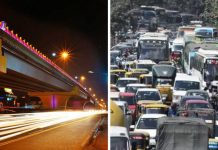
Bengaluru will be spending crores of Rupees for infrastructure development and to ease traffic congestion in the city over the next years.
Infrastructure projects
Bengaluru will be investing Rs 27,000 crore on infrastructure projects, such as the suburban rail project to ease traffic congestion in the city over the next 40 months. The city is expanding rapidly with its space occupying growth increasing by 60 sq km per year within the metropolitan region.

A report in the Deccan herald said, the city has been investing in flyovers, road widening, and junction improvement projects, but this has only resulted in more traffic jams. It is clear the city needs to move away from the current ‘traffic management’ approach to adopt transformative solutions.

The number of private vehicles in Bengaluru has also increased over a decade. The numbers have grown from 5.03 million to 10.04 million, while the number of its public transport buses barely crawled their way, from 6,064 (2011) to 6,763 (2022).

Other reforms
The government is looking forward to deploying 5,450 e-buses across five cities, including Bengaluru. To make the most of this opportunity, the Bengaluru Metropolitan Transport Corporation (BMTC) aims to increase its fleet size to 12,000 buses within the next five years.

For improving the traffic congestion in Bengaluru, the completion of Namma Metro’s Phase II is crucial. And improving the suburban rail project which is planned for 149.348 km with 64 stations will also help in the same.

Using parking as an effective tool, Bengaluru needs to undertake policy reforms to address its ever-increasing demand for parking. These include incorporating pricing models for parking, setting strict norms for parking space requirements (both on-street and off-street parking), ensuring zero parking along busy corridors, and diverting revenue generated from parking charges towards building better infrastructure.

Bengaluru is at a crucial moment. Decisions and projects executed today will be implemented for the next 50-100 years. As the city focuses on large-scale infrastructure investments, it also needs to look at more far-reaching, equitable, and sustainable solutions that will make navigating the city smoother for all.


































